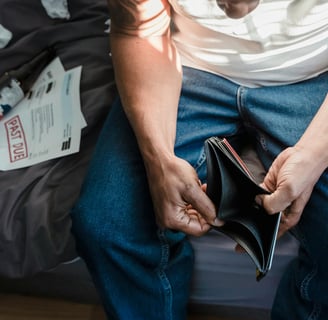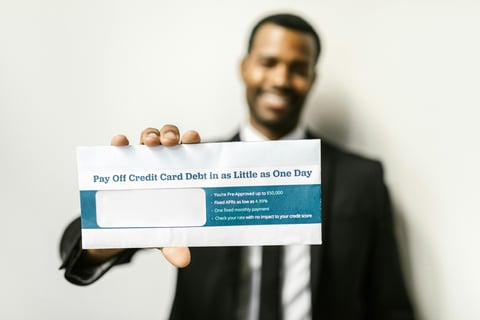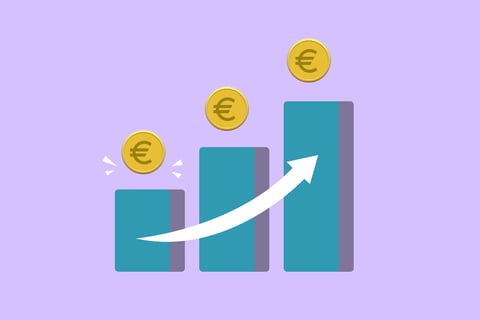The Debt-Free Journey: How to Break Free from Debt in 2025 | Jupetsa
Discover a proven path to becoming debt-free. Learn real strategies, cultural insights, and practical steps to transform your financial life. Start your debt-free journey today.
1/29/20258 min read


The Debt-Free Journey: From Financial Chaos to Freedom
Have you ever stood in the grocery store, calculator in hand, trying to decide between buying fresh vegetables or paying your electricity bill? I have. That moment—watching other shoppers breeze through checkout while I agonized over every item—was just one of countless humiliating experiences that marked my life in debt. But here's what I didn't know then: that rock-bottom moment would become the foundation of my transformation.
Whether you're in the bustling streets of Lusaka or the suburbs of Chicago, debt's grip feels the same. The numbers are staggering: while 77% of American households carry some form of debt, the story isn't much different in Zambia, where many families struggle with kaloba (informal loans) and mounting financial pressures. Behind each statistic is a real person with real dreams on hold. I was one of them. This isn't just another financial advice post—it's a raw, honest account of how I went from K450,000 ($16,500) in debt to complete financial freedom, and more importantly, how you can do it too, regardless of where you call home.
The Weight of Financial Chains
The first time I maxed out a credit card, I felt physically ill. By the fifth time, it had become numbingly routine. Living in Zambia, where the lending system combines formal banking with informal lending networks, the pressure is immense. My story isn't unique—it started with "responsible" debt: student loans for a degree that promised a bright future, plus family obligations that couldn't be ignored.
Then came the car loan because I “needed” reliable transportation to navigate between my job in town and my family home in Chongwe. Credit cards slowly crept in, first for emergencies, then for everyday expenses as my income failed to keep pace with the rising cost of living in Lusaka. The mixture of traditional family financial responsibilities and modern banking pressures created a perfect storm.
My breaking point? It wasn't the sleepless nights or the constant phone calls from creditors. It wasn't even the mounting kaloba interest that seemed to grow faster than the corn in our family field. It was when my daughter asked me why we never went on vacation like her friends did. I didn’t have an answer. All I had was a knot in my stomach and a mountain of debt that seemed impossible to climb. While other parents planned elaborate celebrations and vacations, I could barely afford a cake. I shed tears just thinking I could not even afford taking my children for a simple shopping or outing. The look in her eyes when I explained my situation still haunts me. I remember lying awake at night, staring at the ceiling, wondering if we’d ever escape. The guilt was crushing. My daughter deserved more. I deserved more. That night, I made a promise—not just to her, but to myself. This wasn't the legacy I wanted to leave.
The Debt-Free Journey Begins: More Than Just Numbers
Starting my Debt-Free Journey required a complete mindset overhaul. It wasn't just about paying bills; it was about reimagining my entire relationship with money, balancing cultural expectations with financial wisdom. The first step was the hardest: facing the truth. I gathered every bill, every statement, every loan document, and even listed the informal loans from family members—a practice often overlooked but crucial in our community. The total: K450,321.90 ($16,678.58). Seeing that number in black and white nearly broke me, but it also became my rallying cry.
The First Win: Paying Off That $500 Credit Card
I started with a K 10,800 about $400 credit card bill that had been hanging over my head for months. I cut back on everything I could—lunch runs, takeout, even my gym membership—and threw every spare kwacha at that debt. Three months later, it was gone.
That first win was like a shot of adrenaline. For the first time in years, I felt like I was in control. That momentum carried me to the next debt, and the next.
The Psychology of Financial Freedom
What I discovered about the Debt-Free Journey is that it's 20% mathematics and 80% psychology. The physical act of paying down debt is straightforward—it's wrestling with your own habits, beliefs, and cultural expectations that proves challenging. I had to confront some uncomfortable truths:
My "normal" spending wasn't normal at all—it was a coping mechanism
I was trying to buy happiness in monthly instalments
My financial habits were a direct reflection of my self-worth
Cultural obligations needed to be balanced with financial health
The pressure to maintain appearances was destroying my future
The Strategy That Changed Everything
While researching my Debt-Free Journey, I discovered various debt-reduction methods. The debt snowball method resonated with me, but I modified it to create what I call the "Freedom Framework," adapting it to work within both formal and informal financial systems:
The Reality Check Phase
Complete financial audit (including informal loans and family obligations)
Categorization of all expenses, including traditional and cultural commitments
Identification of emotional and cultural spending triggers
Assessment of sustainable vs. unsustainable traditional obligations
The Reset Phase
Creation of a zero-based budget incorporating both modern and traditional financial responsibilities
Emergency fund establishment (particularly crucial in economies with limited social safety nets)
Development of a "freedom timeline" that respects both personal and community needs
Setting up a "cultural obligations fund" to manage traditional responsibilities sustainably
The Revolution Phase
Implementation of the modified snowball method
Weekly financial check-ins
Celebration of small victories
Community engagement and education
Unexpected Lessons from the Debt-Free Journey
The Power of Community
One of the most surprising discoveries during my Debt-Free Journey was the importance of community, but in a way that transformed traditional support systems into financial strength. I joined online forums and local financial wellness groups, finding strength in shared experiences. These connections provided:
Accountability partners who understood both local and global financial challenges
Creative money-saving tips adapted to local markets and resources
Emotional support during setbacks
Ways to maintain social connections without expensive gatherings
Strategies for managing family expectations while staying on track
The Ripple Effect
Paying off debt didn’t just change my bank account—it changed everything. As I progressed on my Debt-Free Journey, changes appeared in unexpected areas of my life:
Physical Health
Stress-related health issues decreased
The constant anxiety disappeared. I could finally sleep again.
Energy levels increased naturally
Better nutrition through smart shopping at local markets
Reduced dependence on expensive processed foods
Career Growth
Gained confidence to negotiate salary
Started a side hustle selling at local markets
Developed valuable financial management skills
Created additional income streams through traditional crafts
Built business connections in both formal and informal sectors
Family Dynamics
Open conversations about money with children
Stronger partnership with spouse. The stress of debt had put a wedge between us. But as we worked together to pay it off, we became a team again.
New family traditions that don't revolve around spending
Better balance of extended family obligations
More authentic relationships based on presence, not presents
I Found Joy in the Little Things. Without debt hanging over my head, I could actually enjoy life—simple things like a quiet evening at home, a cup of coffee with a friend, or a trip to the park with my daughter.
I Started Saving
Once the debt was gone, I redirected that money into savings. For the first time ever, I had an emergency fund.I wasn’t living paycheck to paycheck anymore.
The Hidden Benefits of Financial Freedom
What makes the Debt-Free Journey truly transformative are the unexpected gifts it brings. Beyond the obvious financial benefits, I discovered:
Mental Clarity
The mental space previously occupied by financial worry became available for creativity and growth. I started writing, picked up photography, and finally read those books that had been collecting dust. More importantly, I could focus on building a better future instead of just surviving the present.
Time Abundance
Without the need for overtime or extra shifts to cover debts, I reclaimed hours each week. This time transformed into:
Quality moments with family
Personal development opportunities
Community involvement
Traditional skills development
Mentoring others on their financial journeys
Emotional Intelligence
Managing money effectively required developing:
Better communication skills
Increased self-awareness
Enhanced decision-making abilities
Cultural competence in financial matters
Balanced approach to traditional and modern financial demands
Advanced Strategies for Your Debt-Free Journey
The Money Mindset Makeover
Success on your Debt-Free Journey requires rewiring your relationship with money while honoring cultural values. Here's what worked for me:
Value-Based Spending
Aligning purchases with core values
Creating spending rules that reflect priorities
Regular financial value assessments
Balancing individual needs with community responsibilities
Finding ways to honor traditions without breaking the bank
Income Optimization
Skills development for career advancement
Strategic side hustle selection in local markets
Passive income stream creation
Leveraging traditional skills for modern markets
Exploring global digital opportunities
The Freedom Fund Strategy
Beyond emergency savings, I developed what I call a "Freedom Fund":
Three months of basic expenses
Opportunity money for investments
"Life happens" buffer for unexpected costs
Cultural obligations buffer
Community support reserve
Maintaining Momentum on Your Debt-Free Journey
The 90-Day Sprint Method
I broke down my Debt-Free Journey into 90-day sprints, each with specific goals:
Sprint 1: Foundation
Basic budget implementation
Expense tracking system setup
Initial debt payoff strategy
Cultural obligation assessment
Community resource mapping
Sprint 2: Acceleration
Income increase initiatives
Lifestyle optimization
Debt snowball momentum
Traditional market opportunities
Skills monetization
Sprint 3: Transformation
Wealth-building habits
Long-term financial planning
Legacy creation
Community impact initiatives
Sustainable cultural practice integration
Your Turn: Starting Your Debt-Free Journey
The path to financial freedom isn't a straight line—it's a series of small decisions that compound over time. Here's how to begin:
Start Where You Are
Document your current financial situation
Identify your primary financial pain points
Set realistic, achievable goals
Map your cultural obligations
Assess your support systems
Build Your Support System
Find accountability partners
Join financial wellness communities
Share your goals with trusted friends
Engage with local savings groups
Connect with global debt-free communities
Create Your Action Plan
Develop a realistic budget
Choose your debt payoff strategy
Establish progress tracking methods
Plan for cultural commitments
Set up success metrics
The Future Is Yours to Create
Today, standing on the other side of my Debt-Free Journey, I can tell you it's worth every sacrifice. Whether you're in Lusaka or London, the freedom to make choices based on values rather than financial constraints is priceless. The peace of knowing you're building a legacy of financial wisdom for your children, while honoring your cultural heritage, is immeasurable.
Remember, your Debt-Free Journey isn't just about paying off bills—it's about creating a life of purpose, intention, and freedom that bridges traditional values with modern financial wisdom. Remember, financial freedom isn't just about the numbers in your bank account – it's about the peace in your heart, the dignity in your steps, and the legacy you'll leave. Your journey to freedom starts now. The path won't always be easy, but neither is living under the weight of debt. Choose your hard.
Are you ready to begin your transformation? Your Debt-Free Journey starts now. Whether you're dealing with bank loans or kaloba, whether you're saving in kwacha or dollars, the principles remain the same. The only question is: when will you take your first step?
Ready to Take Action? Get My Free Budgeting Guide
If you’re ready to start your own Debt-Free Journey, I’ve got something for you. I’ve put together a free budgeting planner that will help you organize your finances, set realistic goals, and stay on track.
👉 Download the Free Bugdet Planner Here!
Or, if you want a deep dive into strategies that will transform your financial future, check out my Lifestyle-First Savings Blueprint—a step-by-step guide to saving money without sacrificing the things you love.
Your Debt-Free Journey starts today. Are you ready?
Bonus: How to start using AI to start a small business with Zero investment. Check out How!
Author's Note: This article is based on real experiences but has been adapted to protect privacy. Financial figures have been converted from Zambian Kwacha (K) to USD using approximate exchange rates for clarity. The principles shared here have been successfully applied across different cultural and economic contexts.










Disclaimer: The blog posts on this website is from my experience and for informational purposes only and should not be considered financial advice. Consult with a qualified financial advisor for personalized guidance.
Your money bff feeling lost in the world
Budgeting Tips ?
Contact:
© 2025. All rights reserved.
